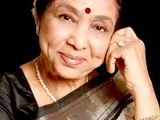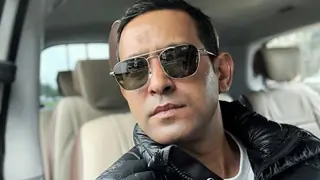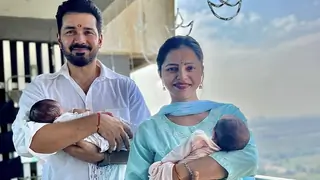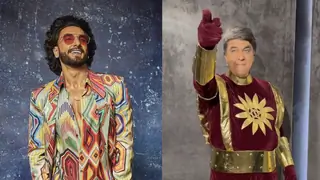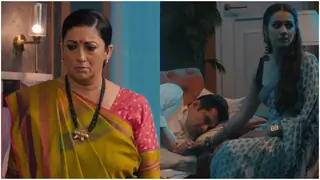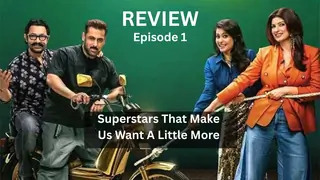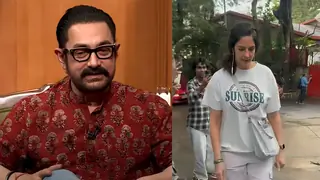Interview With Asha - A day After
A DAY AFTER
She's been widowed twice. And the tragedies have taken their toll. Asha Bhosle broke down, at the Filmfare wards function on February 12, just a month and eighty days after the sudden passing away of her husband. She announced the R.D.Burman award to be given to the best debutant music composer, from next year. Today, she looks much leaner and her trademark laughter and wit are missing. She's with her grand-daughter, listening quietly to the little one's non-stop patter. And you can't help asking...
What're you thinking of at this very moment?
Of life... of death. Of what death leaves behind... troubles, traumas, a sense of isolation. Nothing could have prepared me for the death of R.D... of my husband whom we all called Pancham. I've gone through so much in life, once I nearly went to pieces. It's common knowledge that my first marriage to Bhoslesaab wasn't a happy one... yet I pulled myself together.. and I survived.
verything seemed to be flowing smoothly... then Pancham died. I broke down completely. I'm older now, I'm no longer the young woman who refused to take nonsense. I'm surprised with myself, somehow I've managed to get a hold of myself. This Asha Bhosle won't be defeated that easily, there is a well of anger inside. me.
What has caused this tremendous anger? Surely, your family has rallied around you?
Of course, my three children are standing beside me, giving me all the support they can. I can't expect anything more from them.
But I'm angry at the way other people are treating me. From the moment Pancham died I'm being stabbed in the back. My marriage has become a household topic, it is being turned into a scandal. If I was a 16 year old I could have taken the a .....ating me. From the moment Pancham died I'm being stabbed in the back. My marriage has become a household topic, it is being turned into a scandal. If I was a 16 year old I could have taken the abuses and the accusations in my stride. But with my children and grandchildren around the publicity has been disturbing.
What has promped the accusation that you weren't married to R.D.Burman?
Search me. People talk, it's not possible for me to shut everyone's mouth. But I'm terribly unahppy... I'm upset.. that circumstances after his death have forced me to display my marriage certificate. We didn't want to make a hungama of our marriage. At our age, the groom couldn't have possibly come astride a horse with a lot of band baaja. We couldn't have possibly hosted a big reception at the Taj Mahal Hotel. Pancham and I were no coy, young couple. So we had a very quiet ceremony, we had an Arya Samaj wedding and also a civil registrar marriage. Thank God!! I have the marraige certificate with me now. Our close friends and family members - Gogi Anand, Ramesh Behl, Sapan Chakroborty, Badal Bhattacharya, my bhabhi Bharati and didi Lata Mangeshkar and my secretary Babubhai were all there.
Why didn't you change your name to Mrs.Burman then?
He dissuaded me from changing my name. He said that Asha Bhosle had been very lucky for me. He pointed out that Geeta Roy's career had nose dived once she took on the name of Geeta Dutt.
Didn't Lata didi dissuade you from marrying R.D.Burman?
Not at all. We Mangeshkars follow the policy of non-interference. We're there if we need one another.
What made you opt for a second marriage?
I wanted to stop tongues .....Not at all. We Mangeshkars follow the policy of non-interference. We're there if we need one another.
What made you opt for a second marriage?
I wanted to stop tongues from wagging. If we hadn't married people who have said, "Dekha, she has no shame, going around with him."
Since you lived separately, it did seem that your marriage was on the rocks.
What rubbish! I wasn't a nai naveli dulhan who had to go into a new house and touch her saasu's feet! Before our marrige, I had told Pancham that I would look after both our houses. He was ware that I was totally devoted to my children (Anand, Hemant and Varsha). If my children weren't around perhaps I wouldn't have married again. I didn't want them to feel embarrassed; I wanted them to hold their heads up high.
How did your children take to R.D.Burman as a step-father?
He was no stranger to them. They'd call him Pancham uncle.
You're first marriage had ended bitterly. So didn't you hesitate before taking the plunge again?
You tell me... do all marriages have to end bitterly? All marriages have their own specific problems. And the second time around, I was more alert. Once bitten twice shy. We both had our independence and yet we were bonded. He wanted me to have my own identity.. and I tried not to be the typical nagging wife.
Were there things about him that you wanted to control but couldn't?
I didn't approve of his drinking. He had diabetes, so I also tried to control his eating habits. But he wasn't a two-year old kid. I couldn't possibly have taken him on my lap and spoon-fed him! Since I'd have to go for recordings or concerts, he'd slip back into hi ....ntrol his eating habits. But he wasn't a two-year old kid. I couldn't possibly have taken him on my lap and spoon-fed him! Since I'd have to go for recordings or concerts, he'd slip back into his old ways. I didn't like his late nights as well. He'd stay awake late into the night listening to music.. or he'd go out for a party or two.
He'd just returned from a party the night he died. Do you feel guilty about not being there when he needed you?
Who says I wasn't there? I'd gone to Pancham's house at Khar around midnight. But since he'd gone out I went to my house in Prabhu Kunj. When I got a call that he wasn't feeling well, I rushed immediately to his house. My son drove like mad; we reached there in 15 minutes. He held my hand, he spoke a few words to me... we tried all we could, but it was of no use.
He died and the talk started that I was trying to grab his money. I'm not money mad. Otherwise, I wouldn't have married Mr.Bhosle who was earning Rs.100 a month. I'd have married a lakhpathi! Mr.Bhosle died in 1966, till 1970 his mother was alive. I've supported their family.. I give money, I don't take it.
Tell me, when did you first meet R.D.Burman?
I remember the day very clearly. It was years ago, I was recording the song Lehron mein jhooloon for Armaan. Pancham must have been in his final year in school then, he dropped in at the recording studio one day. Sachinda brought him to me and told him, "Meet her, yeh bahut badi singer hai."
Pancham didn't complete school; he began to assist his father. i remember yelling at him then - I was already married. I had children and looked matronly.. he was thin and gawky. I knew more about life than he di .....
omplete school; he began to assist his father. i remember yelling at him then - I was already married. I had children and looked matronly.. he was thin and gawky. I knew more about life than he did; I told him that he should have finished his studies. Years later, Pancham told me that he was upset by what I'd said. "If I'd run after books, I wouldn't have become a music director."
Which was the first song you did for him?
He'd started working with his father in films like Nau Do Gyarah. In our free time, we'd go into an adjoining room and play table tennis. His first independent composition which I sang was Maar dalega darde jigar (Pati Patni). That was the beginning; we worked together on many films. I came to know him better. I even attended his wedding!
Didn't R.D.Burman live in his father's shadow?
No. Temperamentally, the two were very different. Sachinda was more like a raja, Pancham was more of a commoner, he mixed with others freely... some people said that Pancham copied his father's music, I don't think so. Ever since he became a music director in his own right, he lived separately. Sachinda preferred folk tunes while Pancham would incorporate several kinds of music into his compositions.
Pancham had a great deal of respect for his father - and dada was fond of his son. I remember Sachinda saying with pride that someone on the road had cried out, "Dekho, woh R.D.Burman ka baap ja raha hai."
According to you what was the hallmark of R.D.Burman's music?
His music had some aag, fire in it. His rhythms were challenging. Like O haseena zulfon waali (Teesri Manzil). He was among the first music directors to blend f .....
R.D.Burman's music?
His music had some aag, fire in it. His rhythms were challenging. Like O haseena zulfon waali (Teesri Manzil). He was among the first music directors to blend foreign and Indian styles. Pancham started the double bass here.
He introduced me to jazz music, and he'd listen to Santana, Blood Sweat and Tears and the Rolling Stones. He also loved classical music; after all he'd been a shishya of Ali Akbar Khan.
What was he like as a husband?
He was crazily in love with me. But he was more of a friend than a husband. He'd grown up all alone, he'd spent most of his childhood with his grandmother in Calcutta. So he didn't understand the routines involved in a marriage, he couldn't understand why one had to get up at a particular time or eat at a fixed hour. We lived together as friends.
How would you describe R.D.Burman the man?
He was a gentle soul. He lived his life to the full; he must have died a contented man. I don't think he had many desires left. He didn't like hurting anyone and he was very sentimental. Once when his old car went into a ditch, he was in tears! When his dog Tipsy died, he was inconsolable - he wept for days.
Did he resent any of your earlier relationships? Didn't you rush into marriage soon after breaking up with O.P.Nayyar?
No, it didn't happen that way. And I'd like to make it clear here, that I have never left anyone voluntarily. I've been pushed to a point where I have had no option but to walk away... Pancham wasn't the jealous type. He knew that I had made some mistakes. He understood that no human being is perfect.
Living apart as you did, what sort of a social life did y .....
away... Pancham wasn't the jealous type. He knew that I had made some mistakes. He understood that no human being is perfect.
Living apart as you did, what sort of a social life did you share?
Earlier I used to accompany him to parties but I found myself drinking cups of chai throughout the night. I couldn't do that for long, it would have affected my voice. Moreover, I had to remain fresh for my recordings the next day. So I stopped going to parties with him.
I'll always cherish whatever little time I snatched with him.. I wish we could have been together forever.
Of late his career had reached a stalemate. Did his health slow him down?
Not to the extent of affecting his career. But the industry is a harsh place, if a couple of your films do well, you are put on a pedestal. One flop and you're pulled down into the gutter.
How did he react when other music directors copied him and raced ahead?
He would get angry about this but wouldn't say anything. He knew some people were imitating his style of music and getting away with it. At times when I came home after a recording, he'd smile, "Aaj tumne mere style mein gaana gaaya kya?"
Couldn't you have refused to do such songs?
I was helpless. I had to do what the music directors told me.
Wasn't he upset when his regulars like Shakti Samanta and Dev Anand switched to other music directors?
He couldn't possibly have gone out and begged for work. Pancham was a very self-respecting man. He didn't like what was happening, but he was also very conscious about maintaining his dignity. After all, he was a raja's son.
ncham was a very self-respecting man. He didn't like what was happening, but he was also very conscious about maintaining his dignity. After all, he was a raja's son.
Which are your favourite R.D.Burman's compositions?
It is impossible for me to single out four or five songs. I used to love his jazz music. It's easier for me to remember the music of his films which kept me enthralled - Mere Jeevan Saathi, Teesri Manzil, Ghar and Kati Patang. And now there's 1942 - A Love Story.
Do you think enough is being done to keep R.D.Burman's memory alive? What would you like the music companies to do?
Music companies are taking an interest... but what more will they do than bring out one cassette after another? It's sad, when a man is alive he's ignored, after his death people comes in droves.
What are you doing to make sure that people don't forget him?
I am grateful to Filmfare that it has announced an award for a fresh new music director. Even after my death the R.D.Burman-Filmfare-Times FM award will keep his memory alive.
Just one last question.. what are you busy with right now?
I'm recording non-film songs, singing for a few films. Soon I'll also be busy with my concerts which were planned over a year ago. Let's see.. tomorrow is another day.
Shraddha
Jahagirdar-Saxena










 Perhaps few can match the oomph, sensuality, innocence and ebullience that are so synonymous with her voice.
Perhaps few can match the oomph, sensuality, innocence and ebullience that are so synonymous with her voice.









 The lights dimmed and the voice, that has for over six decades, enthralled, mesmerized and enchanted generations of music lovers and still retains its sultry sensuality, it freshness, its melodious perfection and pitch, soared from the interiors of the back stage, and strains of the sizzling number "Kambaqht Ishq" from the film Pyar Tune Kya Kiya were welcomed by a roar from the audience.
The lights dimmed and the voice, that has for over six decades, enthralled, mesmerized and enchanted generations of music lovers and still retains its sultry sensuality, it freshness, its melodious perfection and pitch, soared from the interiors of the back stage, and strains of the sizzling number "Kambaqht Ishq" from the film Pyar Tune Kya Kiya were welcomed by a roar from the audience. While it is expected that the children of celebrities will follow the same path, you kept the children deliberately away from the industry.
While it is expected that the children of celebrities will follow the same path, you kept the children deliberately away from the industry. The stories about the rivalry between Lataji and you, and how she tried to be one up on you have done the rounds of gossip mills. The movie "Saaz", was supposedly based on your life story. How true is the gossip?
The stories about the rivalry between Lataji and you, and how she tried to be one up on you have done the rounds of gossip mills. The movie "Saaz", was supposedly based on your life story. How true is the gossip? Your career has been divided into two main halves: the O.P. Nayyar days, when you came into your own, and the R.D. Burman days when you reached dizzying heights of success.. What has been the contribution of each music director?
Your career has been divided into two main halves: the O.P. Nayyar days, when you came into your own, and the R.D. Burman days when you reached dizzying heights of success.. What has been the contribution of each music director?